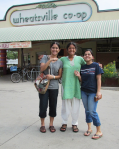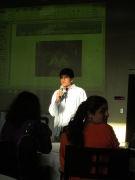
Entrance to Milan, AID fundraising dinner in Dallas
We were sitting in Nandhini restaurant as volunteers buzzed about adjusting the audio visual system and getting ready to start the program. Another chapter, another Milan. I said hello to a woman at my table and she returned the greeting brightly. We introduced ourselves. She had known about AID for some time, but this was her first event. We talked a bit about various projects. After a pause she looked at me and said, “I got the cup!” I smiled. I love it when people get the cup (which by the way is now in India).

Wheatsville Co-op owners, Sucheta and Parvathy
I also love it when people read my articles and tell me that they made a difference. Earlier, Lakshmi told me that String of Jasmine had made a difference to her mother. I was awestruck. In Dallas, Kitchen Shelves in Sunita and Srinadh’s home reminded me of my own days steeped in the co-op scene in Madison, which was already on my mind, as I had just come from what in Wisconsin we called the Madison of the south, known in Texas simply as Austin. There I visited the local co-op along with two of the owners, Sucheta and Parvathy. Walking through the co-op, all the talking points of the Agri session came before us – locally grown food to eat, seeds to plant – and we could take it home. AID Cares indeed!

Kishen speaks about his visit to Mavallipura.
Kishen, a young boy in Dallas spoke about his visit to Mavallipura, where Environmental Support Group is helping villagers save the village from being used as a landfill. Kishen also played violin for the Milan fundraising dinner. Throughout the evening, people from the community shared personal experiences and talked about issues they cared about as well as actions they had taken. Not often in the routine course of life do we get an opportunity share these often emotional stories, and Milan provides the space for all of us to express this side of ourselves.
In Dallas, Sunita talked about how a visit from Michael M had reassured her about growing food at home. Earlier she was afraid that she was killing the plants since so few of hers survived. But he reminded her that in the field many seeds fall without sprouting and not all of the plants survive even in farmers’ fields. Eric Carle illustrates the point beautifully in The Tiny Seed.
While I am in the children’s section let me also recommend Blueberries for Sal, one of my all time favourites. That is a truly deep book. And one delightful book about growing crops –
The Friendly Spider.
These days I talk a lot about food issues. Everything is connected to food issues – health, land, livelihood, learning, debt, corruption, finance and inequality.
So deep do the waters of AID — these days known as KoolAID — run that one does not know who influences whom – it was a mutually supportive environment inspiring us to be the change.
Bringing the food issue home … starts with the food we bring home. Packaged food companies are looking for every possible way to grab customers early and often and then some more often. Every single movement for healthy, homegrown, home-made food gets picked up by the food industry in its single minded goal of passing off edible food lie substances for food. No, to pass them off as better than food. The first entry packaged food makes is as a snack, and in order to cut off this entry point, I am starting a series on Simple Snacks.
Eating, Wendell Berry has said, is an agricultural act. What we eat the farmers grow. Land, energy, water and welfare policies direct what is available and affordable but whatever effort we can make to direct those policies in a direction that is healthier and more sustainable, for our people and our planet.
Who can really say who inspires whom? Milan helps us make all of these connections.
In Maryland, Hope for Humanity, whose members have individually been very strong supporters of AID, now see Milan as an annual way to stay connected as an organization. Every year at least one member of the organization attends, makes a donation on behalf of Hope for Humanity and speaks about our continued association. In Austin we saw people from the community who have been involved at the local level with Saheli and also with South Asian Women’s Network.
And the networks of mutuality go on.


